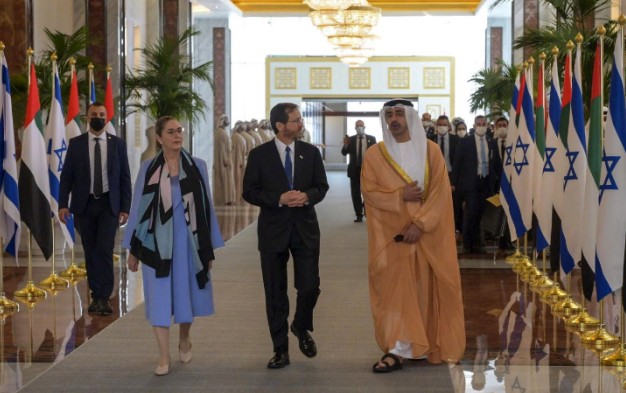According to authorities, the UAE intercepted a ballistic missile fired by Yemen’s Houthi rebels early Monday as the Israeli president was visiting the country, marking the third such attack in recent weeks.
The missile launch heightens tensions in the Persian Gulf, which have already seen a series of attacks near – but never clearly on – Emirati territory. It comes at a critical time in Yemen’s years-long conflict, as well as the failure of Iran’s nuclear deal with Western powers.
The interception was reported by the UAE’s state-run WAM news agency, which stated that «the attack did not result in any losses, as the remnants of the ballistic missile fell outside of populous regions.»
The location of the missile fragments was not immediately known. The UAE’s civilian air traffic control agency stated that there would be no immediate impact on air travel in the country, which is home to long-haul carriers Emirates and Etihad.
People who video or upload photographs of such an incident in the UAE, an authoritarian federation of seven sheikhdoms on the Arabian Peninsula, will face criminal penalties, according to the country’s top prosecutor. Journalists’ reporting on such situations is made even more difficult as a result of this.
In the absence of those films, the Emirati Defense Ministry published black-and-white footage of a ballistic missile launcher being destroyed 30 minutes after the attack in Yemen’s al-Jawf area. A similar hit on al-Jawf was conducted minutes later in another attack last week, prompting observers to speculate that the Emiratis may be receiving intelligence support from the West for their strikes.
Al-Jawf is a town in the UAE, located 1,350 kilometers southwest of Abu Dhabi.
On Twitter, Houthi military spokesman Yehia Sarei said the rebels will declare an attack in the coming hours that would reach «the depths of the UAE.» He didn’t go into detail, and nothing was broadcast on the Houthis’ Al-Masirah satellite news program right away.
On a state visit, Israeli President Isaac Herzog is in the nation. Sheikh Mohammed bin Zayed Al Nahyan, Abu Dhabi’s strong crown prince, met with the ceremonial leader on Sunday.
When informed about the missile intercept, Herzog’s office later told The Associated Press that the trip was «anticipated to continue as planned.» It didn’t go into detail. Herzog was set to visit the Expo 2020 world’s expo in Dubai on Monday, which the Houthis had vowed to attack.
In a similar attack last week, both Emirati and US forces used interceptor missiles to stop a Houthi onslaught.
A Houthi drone and missile attack on an Abu Dhabi National Oil Co. gasoline station the week before had killed three individuals and injured six more. Another attack was launched against Abu Dhabi International Airport, yet no damage was shown in satellite photographs assessed by the Associated Press. The attack occurred during South Korean President Moon Jae-visit in’s to the United Arab Emirates.
Despite having mostly withdrawn its own forces from Yemen, the UAE remains actively involved in the fighting. It backs militias fighting the Houthis, who took over Sanaa, Yemen’s capital, in September 2014.
The missile attacks on the UAE come at a time when the Houthis are under siege and suffering high casualties on the battlefield. Yemeni government forces, backed by the United Arab Emirates, have beaten back rebels in crucial areas.
Government forces, aided by the Emirati-backed Giants Brigades, reclaimed the province of Shabwa earlier this month, dealing a blow to Houthi aspirations to take control of the entire northern half of Yemen.
Despite the fact that Emirati forces have been killed in the battle, the war had had no direct impact on daily life in the wider UAE, which has a large foreign workforce, until this month.


Be the first to comment on "While the Israeli president is in town, the UAE intercepts a Yemeni missile"